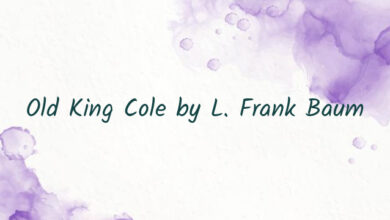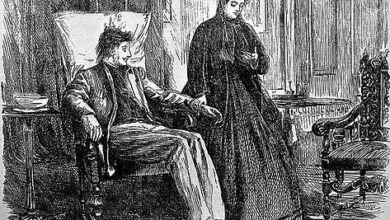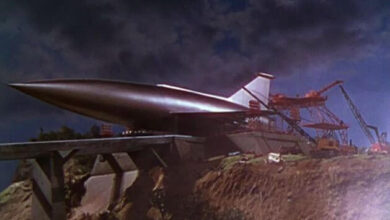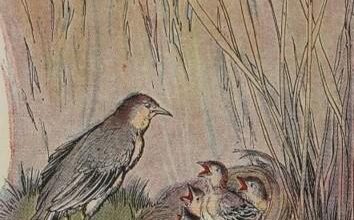
The Spook House by Ambrose Bierce
On the road leading north from Manchester, in eastern Kentucky, to Booneville, twenty miles away, stood, in 1862, a wooden plantation house of a somewhat better quality than most of the dwellings in that region. The house was destroyed by fire in the year following- -probably by some stragglers from the retreating column of General George W. Morgan, when he was driven from Cumberland Gap to the Ohio river by General Kirby Smith. At the time of its destruction, it had for four or five years been vacant. The fields about it were overgrown with brambles, the fences gone, even the few negro quarters, and out-houses generally, fallen partly into ruin by neglect and pillage; for the negroes and poor whites of the vicinity found in the building and fences an abundant supply of fuel, of which they availed themselves without hesitation, openly and by daylight. By daylight alone; after nightfall no human being except passing strangers ever went near the place.
It was known as the “Spook House.” That it was tenanted by evil spirits, visible, audible and active, no one in all that region doubted any more than he doubted what he was told of Sundays by the traveling preacher. Its owner’s opinion of the matter was unknown; he and his family had disappeared one night and no trace of them had ever been found. They left everything–household goods, clothing, provisions, the horses in the stable, the cows in the field, the negroes in the quarters–all as it stood; nothing was missing– except a man, a woman, three girls, a boy and a babe! It was not altogether surprising that a plantation where seven human beings could be simultaneously effaced and nobody the wiser should be under some suspicion.
One night in June, 1859, two citizens of Frankfort, Col. J. C. McArdle, a lawyer, and Judge Myron Veigh, of the State Militia, were driving from Booneville to Manchester. Their business was so important that they decided to push on, despite the darkness and the mutterings of an approaching storm, which eventually broke upon them just as they arrived opposite the “Spook House.” The lightning was so incessant that they easily found their way through the gateway and into a shed, where they hitched and unharnessed their team. They then went to the house, through the rain, and knocked at all the doors without getting any response. Attributing this to the continuous uproar of the thunder they pushed at one of the doors, which yielded. They entered without further ceremony and closed the door. That instant they were in darkness and silence. Not a gleam of the lightning’s unceasing blaze penetrated the windows or crevices; not a whisper of the awful tumult without reached them there. It was as if they had suddenly been stricken blind and deaf, and McArdle afterward said that for a moment he believed himself to have been killed by a stroke of lightning as he crossed the threshold. The rest of this adventure can as well be related in his own words, from the Frankfort Advocate of August 6, 1876:
“When I had somewhat recovered from the dazing effect of the transition from uproar to silence, my first impulse was to reopen the door which I had closed, and from the knob of which I was not conscious of having removed my hand; I felt it distinctly, still in the clasp of my fingers. My notion was to ascertain by stepping again into the storm whether I had been deprived of sight and hearing. I turned the doorknob and pulled open the door. It led into another room!
“This apartment was suffused with a faint greenish light, the source of which I could not determine, making everything distinctly visible, though nothing was sharply defined. Everything, I say, but in truth the only objects within the blank stone walls of that room were human corpses. In number they were perhaps eight or ten–it may well be understood that I did not truly count them. They were of different ages, or rather sizes, from infancy up, and of both sexes. All were prostrate on the floor, excepting one, apparently a young woman, who sat up, her back supported by an angle of the wall. A babe was clasped in the arms of another and older woman. A half- grown lad lay face downward across the legs of a full-bearded man. One or two were nearly naked, and the hand of a young girl held the fragment of a gown which she had torn open at the breast. The bodies were in various stages of decay, all greatly shrunken in face and figure. Some were but little more than skeletons.
“While I stood stupefied with horror by this ghastly spectacle and still holding open the door, by some unaccountable perversity my attention was diverted from the shocking scene and concerned itself with trifles and details. Perhaps my mind, with an instinct of self-preservation, sought relief in matters which would relax its dangerous tension. Among other things, I observed that the door that I was holding open was of heavy iron plates, riveted. Equidistant from one another and from the top and bottom, three strong bolts protruded from the beveled edge. I turned the knob and they were retracted flush with the edge; released it, and they shot out. It was a spring lock. On the inside there was no knob, nor any kind of projection–a smooth surface of iron.
“While noting these things with an interest and attention which it now astonishes me to recall I felt myself thrust aside, and Judge Veigh, whom in the intensity and vicissitudes of my feelings I had altogether forgotten, pushed by me into the room. ‘For God’s sake,’ I cried, ‘do not go in there! Let us get out of this dreadful place!’
“He gave no heed to my entreaties, but (as fearless a gentleman as lived in all the South) walked quickly to the center of the room, knelt beside one of the bodies for a closer examination and tenderly raised its blackened and shriveled head in his hands. A strong disagreeable odor came through the doorway, completely overpowering me. My senses reeled; I felt myself falling, and in clutching at the edge of the door for support pushed it shut with a sharp click!
“I remember no more: six weeks later I recovered my reason in a hotel at Manchester, whither I had been taken by strangers the next day. For all these weeks I had suffered from a nervous fever, attended with constant delirium. I had been found lying in the road several miles away from the house; but how I had escaped from it to get there I never knew. On recovery, or as soon as my physicians permitted me to talk, I inquired the fate of Judge Veigh, whom (to quiet me, as I now know) they represented as well and at home.
“No one believed a word of my story, and who can wonder? And who can imagine my grief when, arriving at my home in Frankfort two months later, I learned that Judge Veigh had never been heard of since that night? I then regretted bitterly the pride which since the first few days after the recovery of my reason had forbidden me to repeat my discredited story and insist upon its truth.
“With all that afterward occurred–the examination of the house; the failure to find any room corresponding to that which I have described; the attempt to have me adjudged insane, and my triumph over my accusers–the readers of the Advocate are familiar. After all these years I am still confident that excavations which I have neither the legal right to undertake nor the wealth to make would disclose the secret of the disappearance of my unhappy friend, and possibly of the former occupants and owners of the deserted and now destroyed house. I do not despair of yet bringing about such a search, and it is a source of deep grief to me that it has been delayed by the undeserved hostility and unwise incredulity of the family and friends of the late Judge Veigh.”
Colonel McArdle died in Frankfort on the thirteenth day of December, in the year 1879.




